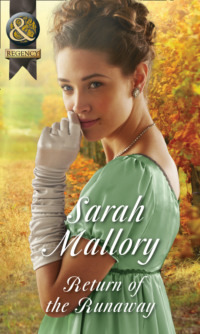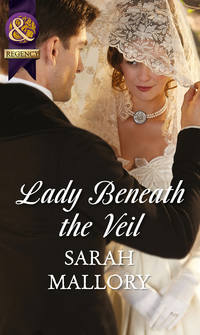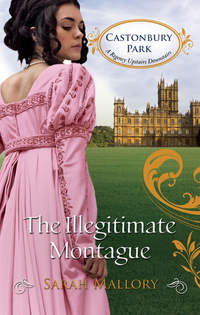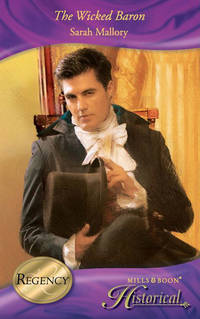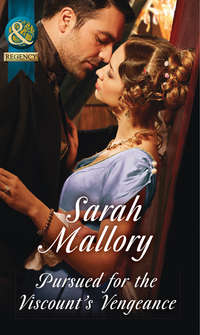
Полная версия
More Than A Governess

“She might be quite pretty, if she were dressed up.”
Damon thought of the little governess in her dull clothes with her soft brown hair braided so modestly around her head.
He sipped his wine, imagining the girl in an evening gown. Silk, he thought. It would cling to her slender body. And emerald-green, to match her eyes, eyes that could suddenly gleam with mischief. He gave himself a little mental shake.
“No, I’ve no interest there. It has never been my way to tamper with innocents, or raise false hopes.”
More Than a Governess
Harlequin®Historical #233—April 2008
MILLS & BOON
Before you start reading, why not sign up?
Thank you for downloading this Mills & Boon book. If you want to hear about exclusive discounts, special offers and competitions, sign up to our email newsletter today!
SIGN ME UP!
Or simply visit
signup.millsandboon.co.uk
Mills & Boon emails are completely free to receive and you can unsubscribe at any time via the link in any email we send you.
SARAH MALLORY
was born in the West Country and now lives in an old farmhouse on the edge of the Pennines with her husband and family. Born in Bristol, Sarah left grammar school at sixteen to work in companies as varied as stockbrokers, marine engineers, insurance brokers, biscuit manufacturers and even a quarrying company. Her first book was published shortly after the birth of her daughter. She has published more than a dozen books under the pen name of Melinda Hammond, winning the Reviewers’ Choice Award in 2005 from Singletitles.com for Dance for a Diamond, and the Historical Novel Society’s Editors’ Choice in November 2006 for Gentlemen in Question.
More Than a Governess
SARAH MALLORY

TORONTO • NEW YORK • LONDON
AMSTERDAM • PARIS • SYDNEY • HAMBURG
STOCKHOLM • ATHENS • TOKYO • MILAN • MADRID
PRAGUE • WARSAW • BUDAPEST • AUCKLAND
Available from Harlequin®Historical and SARAH MALLORY
More Than a Governess #233
DON’T MISS THESE OTHER NOVELS AVAILABLE NOW:
#891 KLONDIKE FEVER—Kate Bridges
Robbed at gunpoint, chained to a drifter, Lily thinks life can’t get any worse—until she realizes that she’s shackled to the one man she’s never been able to forget!
Don’t miss the continuation of Kate Bridges’s thrilling Klondike series!
#892 NO PLACE FOR A LADY—Louise Allen
Miss Bree Mallory has no time for the pampered aristocracy!
She’s too taken up with running the best coaching company on the roads. But an accidental meeting with an earl changes everything….
Join Louise Allen’s unconventional heroine as she shocks Society!
#893 A SINFUL ALLIANCE—Amanda McCabe
Marguerite is exceptionally beautiful—and entirely deadly!
Sent by a king to assassinate the gorgeous Nicolai, she finds herself torn between royal duty and ardent desire.…
Award-winning Amanda McCabe brings us scandal and seduction at the Tudor court!
#894 THE WANTON BRIDE—Mary Brendan
With disgrace just a breath away, Emily ached for Mark’s strong arms to comfort her. Yet she held a secret—one that would surely prevent any gentleman from considering her as a suitable bride….
Can Mary Brendan’s hero’s passion overcome Emily’s fears?
#234 THE KNIGHT’S VOW—Catherine March
Believing she will never marry, Lady Beatrice has made a dramatic decision—she will take up a convent life. But first she must ask a favor of one of her father’s most handsome knights….
Catherine March beautifully evokes medieval England in this tale of love and temptation.
To Terry,
my rock and inspiration
Contents
Chapter One
Chapter Two
Chapter Three
Chapter Four
Chapter Five
Chapter Six
Chapter Seven
Chapter Eight
Chapter Nine
Chapter Ten
Chapter Eleven
Chapter Twelve
Chapter Thirteen
Chapter Fourteen
Chapter Fifteen
Chapter Sixteen
Chapter Seventeen
Chapter Eighteen
Chapter Nineteen
Chapter Twenty
Chapter Twenty-One
Chapter Twenty-Two
Chapter Twenty-Three
Chapter Twenty-Four
Chapter Twenty-Five
Chapter Twenty-Six
Chapter One
Juliana Wrenn thought she had rarely entered a more uninviting chamber than cousin Pettigrew’s drawing room in Bouverie Street. Unpolished panelling, dark hangings and dull green paint on the ceiling seemed to swallow up the sunlight that was valiantly fighting its way through the dirty windows. She felt a little hand gripping her fingers and looked down, summoning up a smile.
‘Are you cold, Amy? I am sure Cousin Pettigrew will not keep us waiting much longer.’
Her little sister hugged her rag doll closer.
‘I want to go home!’ she whimpered.
Juliana sat down on a worn sofa and pulled the little girl on to her lap.
‘You know we can’t do that, love. We must see if Cousin Alfred can help us.’ She smiled up at her younger brother, a stout twelve-year-old who was hovering beside them.
‘Come and sit down, Tom.’
‘I would rather go back to the kitchen,’ said Thomas, thinking of the fruitcake he had left behind when they had been summoned upstairs.
At that moment the door opened, and the three of them jumped to their feet, their eyes fixed on the florid-faced, bewhiskered gentleman who came in.
Juliana gave him her best curtsy.
‘Good afternoon, Cousin. Thank you for seeing us.’
Alfred Pettigrew advanced into the room, stripping off his gloves and dropping them, together with his silver-topped malacca cane, on to a side table.
‘Yes, well, I have just got in—had to carry out the reading of a will in Mount Street. I gather you have been here all morning?’
‘Yes, sir. We asked if we might wait for you and your housekeeper, Mrs Churwell, kindly looked after us.’
‘She gave us cake, and a glass of milk,’ added Amy and was nudged by Thomas, who hissed at her to be quiet. Juliana ignored the interruption.
‘I wrote to you, Cousin.’
‘Aye, you did, and I responded, did I not? Even more, I paid for your father’s funeral, and saw to the settlement of his affairs for you.’
‘Yes, sir, and we are very grateful. But that was three weeks ago, and circumstances have changed.’ She hesitated, for the first time losing some of her self-assurance. ‘The bailiffs called yesterday and removed everything, and Mr Crewe, the landlord, said he had already let the rooms, so we had to leave this morning.’
Mr Pettigrew looked at her.
‘And what am I supposed to do with you?’
‘We were hoping—that is…’ Juliana took a deep breath. ‘We need somewhere to stay. It need only be for a short time, until I can find employment—’
He gave an impatient snort.
‘And what sort of employment could you find, miss, that would allow you to support the three of you?’
She drew herself up, her hands clasped in front of her rather shabby pelisse.
‘Well, Cousin, I was thinking that if you could advance me a small sum, I could find a house for us and earn a living as a tutor. I am very good at French and Italian, and could possibly do a little translation, too…’
‘Out of the question!’ He waved a hand impatiently. ‘Why, I would not see my money again for many a year, if ever.’
Juliana closed her lips firmly, quelling her retort. It was common knowledge that Alfred Pettigrew was a rich man, but it was equally well known that he was not a generous one. She had seen enough of the house to convince her that he was indeed what her father would have called a nip-farthing. She sighed. It was not a charge that could be laid at Papa’s door.
‘Well, then, what are we to do, Cousin Alfred?’ asked Thomas. ‘You are the only relative we have.’
‘You have no need to remind me of that.’ Mr Pettigrew scowled and his heavy jowls shook with disapproval. ‘That my cousin Wrenn should leave his affairs in such disorder, with no means of support for the three of you—unforgivable.’
He paced the room while three pairs of eyes watched anxiously. At length he stopped.
‘Very well. I’ll tell you what I will do. I will send you all to Hinton Slade, my house in Devon. My mother lives there; she is not in the best of health and would welcome a companion, I am sure. That way, Miss Juliana, you can earn your keep. Thomas can help out in the stables and young Amy there can train as a lady’s maid.’
Juliana looked at him in horror.
‘But what about their schooling?’
‘Tush, a boy of twelve doesn’t need schooling. He is better earning his living. And as for the young ’un, well, you can teach her all she needs in your spare time.’
Juliana looked down at her siblings, fighting the urge to take their hands and walk out of Cousin Alfred’s house. Instead she said calmly, ‘That is very kind of you, Cousin. Perhaps you would allow me a few days to consider the matter?’
‘Don’t see there’s anything to consider.’ His lip curled. ‘Unless you have had any better offers?’
‘No, but I would like to make a few enquiries.’ She tried a winning smile. ‘Please, Cousin, may we impose upon your generosity for a few days? I promise you we will be in no one’s way.’
‘Of course you will be in the way! This is a bachelor establishment—it would be most improper for you to be here.’
‘Not if we kept to the servants’ rooms, sir. Mrs Churwell told me that she was obliged to dismiss one of the kitchen-maids, so the three of us could sleep in her room for a few nights. We would be most discreet.’ Remembering the housekeeper’s advice on dealing with the master, she added, ‘I’m sure Mrs Churwell would be grateful for a little help now she’s one girl short in the kitchen.’
She held her breath. Mr Pettigrew frowned at the carpet, puffing out his cheeks. Amy moved restlessly from one foot to the other and Juliana put a reassuring hand on her shoulder.
‘Very well, you can stay, but only for a few days. I can’t have the three of you eating me out of house and home. If you’ve found nothing in a se’ennight, then it’s off to Devon with you.’
‘Oh, thank you, sir!’ Juliana beamed at him. ‘We will be no trouble, I promise you. You will not even know we are in the house.’
Juliana hurried Amy and Thomas back to the kitchens where the housekeeper was waiting for them.
‘Well, miss?’ she asked. ‘It must be good news or you would be out the door by now.’
Juliana smiled. ‘We can stay, and I can help you with the maid’s work until you find a replacement.’
‘Aye, I guessed that would sway him,’ Mrs Churwell tutted. ‘Miserable old skinflint, and him with more money than he knows what to do with.’
‘He did say we could go and live with Aunt Pettigrew,’ said Thomas, brightening when he found his half-eaten cake was still on the table.
The footman, sitting in one corner blacking his shoes, gave a derisive snort.
‘Ha! She’s worse than the master. You’d work your fingers to the bone for that one and not a penny would you get for it. I had a cousin as was groom there for a while, until he joined the army to fight the French. Said he preferred to face Boney himself than old Mrs P.’
‘Aye, Lawrence is right,’ agreed Mrs Churwell, shaking her head. ‘The Pettigrews is a miserly family and no mistake.’
‘And that makes it all the more imperative that I find employment,’ said Juliana, sinking down into a chair by the table.
‘Well, that’s a problem for the morrow,’ replied Mrs Churwell comfortably. ‘Poor dear, I dare swear you have had no end of worry these past few weeks. Now you sit and rest, dearie, and these two youngsters can make themselves useful by shelling peas for dinner.’
Juliana rose early the next morning to find that Mrs Churwell had brought a pile of the master’s newspapers to the kitchen, smiling as she put them down on the table.
‘I thought you might find a suitable post advertised in here, miss. Sit yourself down and study these news-sheets while I take up the master’s breakfast. And don’t you worry about Thomas and little Amy, I’ve set them to folding sheets upstairs, so you can have a bit o’ peace.’
When the housekeeper returned to the kitchen some time later, Juliana was still sitting at the table with the newspapers spread out before her.
‘Well, dearie?’
Juliana sighed.
‘It seems there are far more advertisements for those seeking employment than requiring someone. Listen—“Governess seeks position, no salary required.” What straits must that poor creature be in?’
‘The same as you, Miss Juliana,’ responded Mrs Churwell. ‘You are not to be letting that kind heart o’ yours worry about everyone else’s problems. You have your family to consider, and if you let the master send you all off to Hinton Slade you’ll be stuck in the middle of nowhere, and don’t think old Mrs Pettigrew will help you to better yourself, because she won’t, not when she sees she can have the three of you doing her bidding for a pittance!’
‘I suppose you are right. Oh, Mrs Churwell, it seems a hopeless case.’
‘Not a bit of it,’ came the robust reply. ‘Now, miss, what you must do is to place your own advertisement in the newspaper. And you must write down all the things you can do, just like you told them to me, so that everyone will know what an accomplished young lady you are and they will come begging you to teach their children.’
‘That would certainly be very welcome!’ laughed Juliana. ‘I suppose I could advertise.’
‘Of course you could! Mr P. will be in his office by now, so there will be no one in the morning room, and you’ll find paper, pens and ink there. You go and write it now, my dear. Strike while the iron’s hot, as they say.’
‘I will, Mrs Churwell.’ Juliana rose. ‘I will go and write the best advertisement you have ever read!’
She ran up the stairs, but checked as she reached the top. She could hear voices in the hallway and guessed that Mr Pettigrew was meeting a client. Peeping around the door, Juliana saw her cousin making a deep bow to a tall gentleman. The visitor had his back to her, so that all she could see of the man himself was his black hair and his many-caped driving coat which added even more width to his already large frame.
‘Major Collingham—’ Cousin Alfred’s nose was almost touching his knee ‘—I am most honoured by this visit, sir, following on from our conversation yesterday. But you should not have come out in this rain, sir—I should have been quite happy to bring the papers to you.’
‘No need, Pettigrew. I had to come this way this morning. I needed to place an advertisement and thought I could do it myself and call upon you on my way. I want to get everything signed and sorted before I leave town next week; thought I was doing well, too, until the children arrived yesterday evening, with the news that their governess had given notice!’
‘How unfortunate for you, sir. Come into my office and I will find those papers for you.’
Juliana drew back behind the door as her cousin led the gentleman on, but before the door closed on them she heard the stranger say bitterly,
‘Unfortunate? It’s damned annoying, man! Particularly now, when I need to take the children into Lancashire with me. That’s the third damned woman I’ve hired in as many months! What can be so difficult about looking after a couple of brats? I tell you, Pettigrew, I’d give a king’s ransom to find a governess who could stay the course…’
The door closed upon the two men and Juliana stepped slowly into the hall, nibbling the tip of her finger. She looked at the footman, who was shaking out the man’s greatcoat.
‘Lawrence, that man—do you know him?’
‘Major Collingham, miss?’
‘Yes. Is he…is he one of Mr Pettigrew’s clients?’
The footman shook his head as he laid the greatcoat gently over a large chest.
‘No, miss. But he is trustee for one of ’em.’ He added knowledgeably, ‘He is the sort of well-set-up gentlemen that people like to appoint as executor to manage their affairs when they turn up their toes.’
Juliana smoothed her hands over her gown and said as casually as she could, ‘And, do you perhaps know where he lives?’
‘Oh, aye, miss. I’ve taken papers to his house in Burlington Street many a time.’
Juliana nodded, then turned and made her way back to the kitchen, where Mrs Churwell was busy making pastry.
‘Well, now, that was quick!’ exclaimed the housekeeper, up to her elbows in flour. ‘Have you written your notice already?’
Juliana shook her head, and sat down at the table.
‘No, but I think I have found a solution to my problems!’
Chapter Two
Later that afternoon Juliana put on her best walking dress of holly green with its matching bonnet and set off for Burlington Street. She was fortunate that the rain had stopped, but it remained overcast, and a chill wind stung her cheeks. Following Lawrence’s directions, she found herself staring up at an imposing double-fronted façade. For a moment her courage failed her. Then, squaring her shoulders, she marched up to the front door and knocked loudly.
‘Oh, come along, Juliana Wrenn,’ she muttered to herself. ‘He can’t eat you, after all.’
A liveried footman admitted her to the house and showed her into a small study on the ground floor while he went off to carry her message to his master.
Too nervous to sit down, she stood in the middle of the room and looked about her. The walls were lined with oak panels from floor to ceiling in the same manner as her cousin’s drawing room, but there all similarity between the two houses ended. The panelling in Major Collingham’s study gleamed and several lively hunting scenes hung on the walls. She was just wondering if any of the figures depicted could be the master of the house when a deep voice sounded behind her, making her jump.
‘You wished to see me, madam?’
‘Oh—I did not hear you come in!’
‘I am sorry if I startled you,’ responded the Major, sounding not a whit remorseful.
Juliana looked at him. In her cousin’s hallway she had only seen the back of his head. Now, staring up into the harsh, unsmiling face, her spirits began to fade. He was very tall, and dressed with military precision—there was nothing of the dandy about him, she noted with approval; the long limbs encased in buff-coloured pantaloons and black boots hinted rather at the athlete. His blue coat fitted perfectly about his broad shoulders and the crisp whiteness of his shirt and cravat enhanced his dark complexion, tanned by years in the sun—she knew he had been a soldier, and guessed he had seen action in the Peninsula. His bearing was upright and looked as solid and unyielding as his countenance. His voice, when he spoke again, was tinged with impatience.
‘Well, madam, what can I do for you?’
‘I—I came because—because you require a governess.’
Her words came out in a rush.
‘Then it is my secretary, Brasher, you should see. I made it quite clear in the advertisement.’
He turned to go.
‘Oh, I have not seen the advertisement—and it is you I wish to see, Major Collingham.’
He stopped and turned to face her.
‘Not seen the—then how the devil…?’
His frown was not encouraging, but she screwed up her courage—she must do this for Thomas and Amy’s sake.
‘I am a cousin of Mr Pettigrew, the lawyer. I overheard your conversation with him this morning, about requiring a governess urgently. It—it is a fortunate circumstance for you, sir, that I am looking for just such a post.’
‘I see. Well, if that is the case, I am of course delighted that you have come, but my secretary can handle the details—’
‘But I do not wish to talk to your secretary, Major.’ She swallowed. ‘I—I want to talk to you about my terms.’
The Major raised his black brows.
‘Terms?’
‘Yes.’ She drew a breath and put up her chin. ‘I believe you require a governess to take up the post immediately, sir. Well, I am free to do that, upon condition.’
The Major stared at her. Juliana returned his gaze steadily, praying that he could not hear the rapid thudding of her heart. His countenance relaxed a little.
‘I see this is not going to be the work of a moment.’ He moved to his desk. ‘Pray will you not be seated, miss…?’
‘Miss Wrenn, Major.’ She sat down on the edge of the chair, facing him.
‘Well, Miss Wrenn, it is true that I am in need of a governess, but, as the employer, I was of the opinion that it was my place to set the conditions.’
She did not flinch from his hard gaze. Mrs Churwell had told her to have faith in herself, and she must do just that.
‘In the normal course of events, yes, but you do not appear to be having much success; you told my cousin you would pay a king’s ransom for a governess who could—ah—stay the course was your term, I think?’
He laughed suddenly, and the rather harsh lines of his face softened into something much more attractive.
‘Quite right, Miss Wrenn, I did. Very well, why do you think you would suit my requirements?’
‘Because I have had an excellent education, I am used to dealing with children and can teach them all the usual accomplishments of reading, writing, a little arithmetic and geography, the use of globes; my French and Italian are very good, I play the pianoforte and the harp, I paint and draw, I am a skilled needlewoman and—’
‘And you are desperate for employment.’
She blinked.
‘You do not deny it, Miss Wrenn.’
‘No, sir.’ She looked him in the eye and said with more confidence that she was feeling, ‘But I have imp—impeccable credentials.’
He sat back, folding his arms across his chest and fixing her with a hard stare.
‘You are very young for such a post.’
‘I am one-and-twenty, sir.’
‘What is your experience?’
She clasped her hands in her lap.
‘I was educated in a select seminary in Clapham until I was seventeen years old, and had some teaching of the younger girls while I was there. I learned all the usual accomplishments, and was especially good at languages—a gift from my father, I think. My mother’s demise made it necessary for me to come home and for the past four years I have had the care of my brother and sister.’
‘And what has changed, that you must now seek employment?’
She looked down at her hands. It was not easy to admit her straitened circumstances to a stranger, but it must be done. ‘My father died a month since and all his effects were seized to pay his debts. That is why we are staying with my cousin, until I can find a way to support us all.’
‘And how old are your brother and sister?’
‘My brother is twelve years old, sir. My sister just nine.’ She looked up at the Major, but his face was impassive. She said, with a touch of defiance, ‘I am not looking for sympathy, sir.’
‘I have offered you none. You have been very frank, Miss Wrenn, so let me be equally open with you. I am a widower and have been so for the past eight years. My three children have been in the care of my mother—their grandmother—in Hampshire. Unfortunately, my mother died twelve months ago. Bonaparte had just escaped from Elba and it was impossible for me to leave my regiment at that time, so my sister took the children in; she lives nearby with her own young family. After Waterloo I was eager to settle my affairs and return to England, but it took me until a few months ago to complete my duties and get away.’ He paused and sat forward, resting his arms on the desk. ‘While in the care of my sister, my daughters were taught in the schoolroom with their young cousins, but I was naturally desirous to have the children with me, so I moved them back into Kewhurst, their old home, with a governess to look after them while I completed my business prior to taking them all to Lancashire. To date, as you pointed out to me, Miss Wrenn, I have been singularly unsuccessful in my choice of staff. The first governess lasted less than a week and left the house claiming that the place was haunted. The second I turned off when I discovered her addiction to strong liquor. The third, well, I thought she was settled, so I came on to London to put my affairs in order. I sent for the children to join me, and instead of the governess, they came with their aunt and their old nurse, and the information that the governess had discharged herself.’


